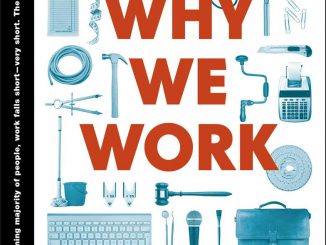
The good news is that 50 percent of your level of happiness is totally within your control: things like your relationships, your health, your career, the things you do…. So even if you’re genetically disposed to be a Debbie Downer, you can still take steps to make yourself a lot happier.
Here are nine things, backed by science, that you can do to be happier:
1. Do what you do best as often as you can.
You know the old cliché regarding the starving, yet happy, artist? Turns out it’s true: Artists are considerably more satisfied with their work than non-artists even though the pay tends to be considerably lower than in other skilled fields.Why? I’m no researcher, but clearly the more you enjoy what you do and the more fulfilled you feel by what you do, the happier you will be.
In The Happiness Advantage, Shawn Achor writes that when volunteers picked “one of their signature strengths and used it in a new way each day for a week, they became significantly happier and less depressed.”
Of course it’s unreasonable to think you can chuck it all and simply do what you love. But you can find ways to do more of what you excel at. Delegate. Outsource. Start to shift the products and services you provide into areas that allow you to bring more of your strengths to bear. If you’re a great trainer, find ways to train more people. If you’re a great salesperson, find ways to streamline your administrative tasks and get in front of more customers.Everyone has at least a few things they do incredibly well. Find ways to do those things more often. You’ll be a lot happier. And probably a lot more successful.
2. Make really good friends.
It’s easy to focus on building a professional network of partners, customers, employees, connections, etc., because there is (hopefully) a payoff. But there’s a definite payoff to making real (not just professional or social media) friends. Increasing your number of friends correlates to higher subjective well-being. In fact, doubling your number of friends is like increasing your income by 50 percent in terms of how happy you feel.
And if that’s not enough, people who don’t have strong social relationships are 50 percent more likely to die at any given time than those who do. (For relative loners like me, that’s a scary thought.) Make friends outside of work. Make friends at work. Make friends everywhere. Above all, make real friends. You’ll live a longer and happier life.
3. Actively express your gratitude and thankfulness.
In one study, couples who expressed gratitude in their interactions with each other experienced increased relationship connection and satisfaction the next day–and that applied both to the person expressing thankfulness and (no big surprise) the person receiving it. (In fact, the study’s authors say gratitude is like a “booster shot” for relationships.) Of course, the same is true at work. Express gratitude for an employee’s hard work and you will both feel better about yourselves.
Another easy method of fostering thankfulness is to write down a few things you are grateful for every night. Another study showed that people who wrote down five things they were thankful for once a week were 25 percent happier after 10 weeks. In effect, they dramatically increased their happiness set-point.
Happy people focus on what they have, not on what they don’t have. It’s motivating to want more in your career, relationships, bank account, etc., but thinking about what you already have, and expressing gratitude for it, will make you a lot happier.It will also remind you that even if you still have huge dreams, you have already accomplished a lot–and should feel genuinely proud.
4. Plan a trip…even if you never take it.
As opposed to actually taking a holiday, simply planning a vacation or break from work can improve your happiness. A study published in the journal Applied Research in Quality of Life showed that the highest spike in happiness came during the planning stage of a vacation, as people enjoy the sense of anticipation: “In the study, the effect of vacation anticipation boosted happiness for eight weeks. After the vacation, happiness quickly dropped back to baseline levels for most people.”
Try it. Think about where you’d like to go and plan the trip, even if you can’t afford it right now. Much of the fun is in the planning, plus you never know: If you work hard enough at your plan, you might find you actually can afford to go. Win-win.
5. Actively pursue your goals.
Goals you don’t pursue aren’t goals, they’re dreams…and dreams only make you happy when you’re dreaming. Pursuing goals, though, does make you happy. David Niven, author of 100 Simple Secrets of the Best Half of Life, writes, “People who could identify a goal they were pursuing were 19 percent more likely to feel satisfied with their lives and 26 percent more likely to feel positive about themselves.”
So be grateful for what you have, and then actively try to achieve more. If you’re pursuing a huge goal, make sure that every time you take a small step closer to achieving it, you pat yourself on the back. But don’t compare where you are now with where you someday hope to be. Compare where you are now to where you were a few days ago. Then you’ll get dozens of bite-size chunks of fulfillment–and a never-ending supply of things to be thankful for.
6. Help other people as often as you can.
While giving is usually considered unselfish, providing social support may be more beneficial than receiving it. Intuitively, I think we all know that because it feels awesome to help someone who needs it. Not only is helping those in need fulfilling, it’s also a reminder of how comparatively fortunate we are–which is a nice reminder of how thankful we should be for what we already have.
Plus, receiving is something you cannot control. If you need help–or simply want help–you can’t make others help you. But you can always control whether you offer and provide help. And that means you can always control, at least to a degree, how happy you are, because giving makes you happier.
Voor de overige tips : link naar orginele artikel
7. Make money…but also make memories.
8. Exercise for 20 minutes after you wake up.
9. Live the life you want to live.
And a bonus tip



